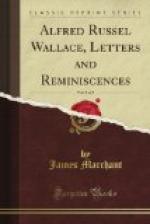Take another instance. Amongst his numerous correspondents there were not a few who decided not to take life, for food, or science, or in war. One young man who went out with the assistance of Wallace to Trinidad and Brazil to become a naturalist, and to whom he wrote many letters[70] of direction and encouragement, gave up the work of collecting—to Wallace’s sincere disappointment—and came home because he felt that it was wrong to take the lives of such wondrous and beautiful birds and insects. Another correspondent, who had joined the Navy, wrote a number of long letters to Wallace setting forth his conscientious objections to killing, arrived at after reading Wallace’s books; and although Wallace endeavoured from prudential considerations to restrain him from giving up his position, he nevertheless wholly sympathised with him and in the end warmly defended him when it was necessary to do so. The sacrifice, too, of human life in dangerous employments for the purpose of financial gain, no less than the frightful slaughter of the battlefield, was abhorrent to Wallace and aroused his intensest indignation. Life to him was sacred. It had its origin in the spiritual kingdom. “We are lovers of nature, from ‘bugs’ up to ‘humans,’” he wrote to Mr. Fred Birch.
By every means he laboured earnestly to secure an equal opportunity of leading a useful and happy life for all men and women. He championed the cause of women—of their freer life and their more active and public part in national service. He found the selective agency, which was to work for the amelioration he desired, in a higher form of sexual selection, which will be the prerogative of women; and therefore woman’s position in the not distant future “will be far higher and more important than any which has been claimed for or by her in the past.” When political and social rights are conceded to her on equality with men, her free choice in marriage, no longer influenced by economic and social considerations, will guide the future moral progress of the race, restore the lost equality of opportunity to every child born in our country, and secure the balance between the sexes. “It will be their (women’s) special duty so to mould public opinion, through home training and social influence, as to render the women of the future the regenerators of the entire human race.”
He was acutely anxious that his ideals should be realised on earth by the masses of the people. He had a large and noble vision of their future. And he had his plan for their immediate redemption—national ownership of the soil, better housing, higher wages, certainty of employment, abolition of preventable diseases, more leisure and wider education, not merely for the practical work of obtaining a livelihood but to enable them to enjoy art and literature and song. His opposition to Eugenics (to adopt the word introduced by Galton, which Wallace called jargon) sprang from his idealism and his love of the people, as well as




